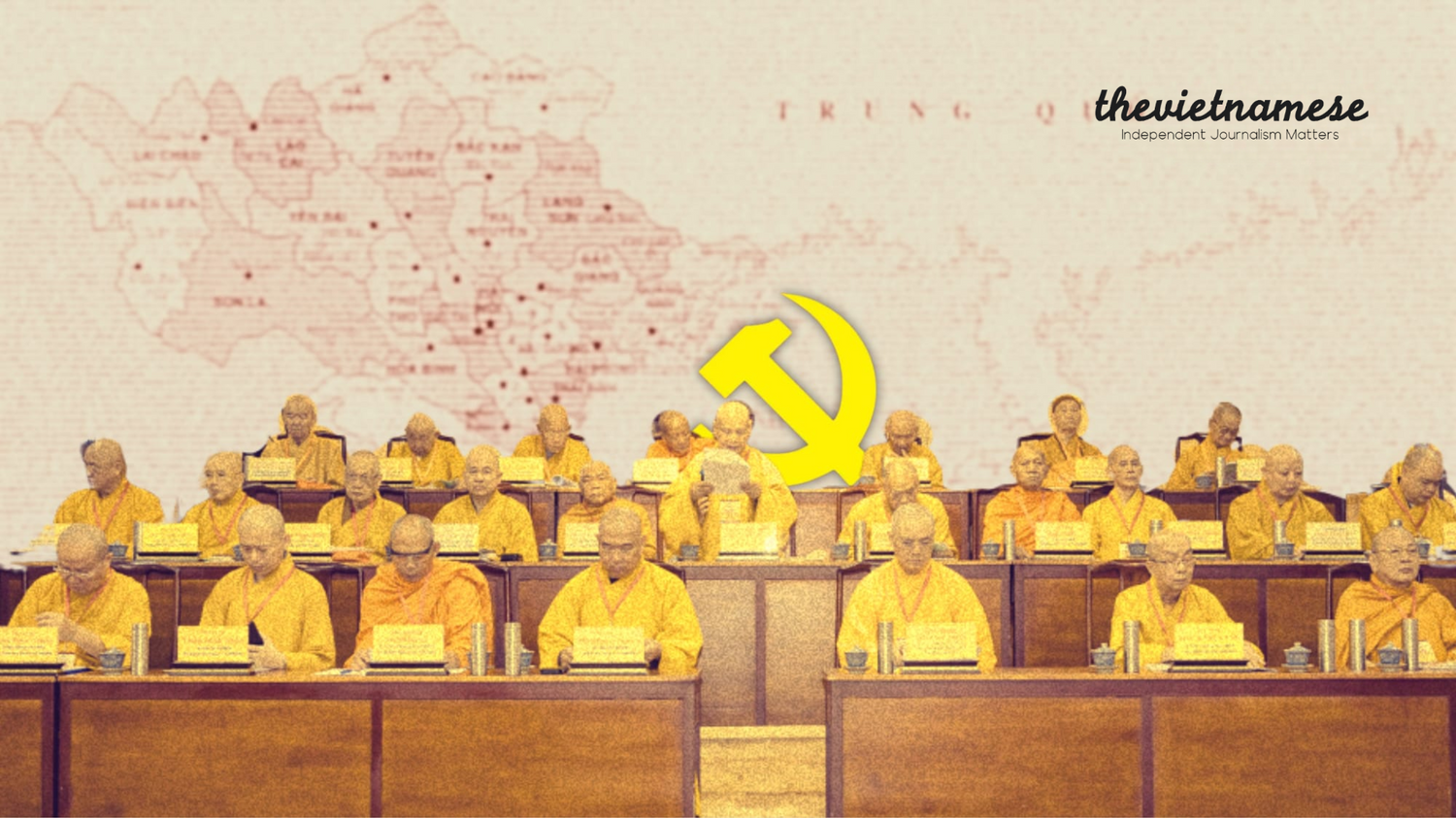Huệ Nhã wrote this article in Vietnamese, published in Luat Khoa Magazine on April 9, 2025.
Following sweeping directives from Việt Nam’s Politburo and the Secretariat of the Communist Party to streamline the entire political system, the Việt Nam Buddhist Sangha (VBS) has initiated its own major restructuring.
The decision was formally made in a resolution adopted on Jan. 5, 2025, during the 4th Conference of the 9th term, though it was not made public until two months later. The move signals the VBS’s effort to align its organization with the government’s new policies.
How the VBS Plans to Restructure
The details of the plan began to emerge at a major conference held on March 21, 2025 at Quảng Đức Zen Monastery in Hồ Chí Minh City. Elder Venerable Thích Thiện Nhơn, Chairman of the VBS Executive Council, attended the event, along with monks and nuns from 34 southern provinces. According to Giác Ngộ newspaper, the Sangha is now soliciting feedback on its proposal, which includes a plan to eliminate district-level Buddhist congresses.
The reforms’ stated aim is to build a leaner, more effective model that aligns with the government’s own administrative policies, specifically Resolution 18-NQ/TW. Venerable Thích Nhật Từ remarked at the conference that the Party’s directives offer the Sangha a timely opportunity to reevaluate its existing structure, which he described as bloated and overlapping, with administrative levels stretching from central down to the commune.
Thích Nhật Từ advocated that the VBS should learn from the government’s drastic reforms. Similarly, author Trần Mộng Tường has suggested concrete steps like merging overlapping functions within the Sangha’s 13 departments, consolidating Buddhist colleges, and unifying its various press outlets.

Revealing the Sangha’s Political Nature
Observers argue that the Sangha’s restructuring reflects its deeply embedded political nature. Writing for RFA Vietnamese, journalist Nam Việt criticized the VBS’s announcement as clear evidence of how politicized the state-sanctioned religious organization has become.
Other commentators have raised concerns about the move’s practical consequences. Author Trần Dân warned that abolishing the district level could grant individual abbot-monks more unchecked authority over local temples, potentially enabling the embezzlement of donations or other forms of corruption.
This aligns with long-standing analysis that the VBS lacks genuine autonomy from the state. Writer Văn Tâm has argued that the government effectively appoints key VBS leadership positions. At the same time, author Nguyễn Thanh Bình noted that all religions in Việt Nam—including Buddhism—must conform to Communist ideology to function legally.
The VBS’s alignment with the state is clearly demonstrated in its unified response to international criticism of Việt Nam’s religious freedom record.
In 2025, the U.S. Commission on International Religious Freedom (USCIRF), alongside human rights organizations like Human Rights Watch and Open Doors, once again highlighted a pattern of repression in the country.
The USCIRF report documented cases of arrest, torture, and forced renunciation of faith among ethnic minority Montagnards, citing the long prison sentences of individuals like Y Krec Bya and Nay Y Blang.
Specific incidents noted include the May 2024 police interrogation of Cao Đài follower Trần Văn Đức after he met with U.S. consular officials, and the November 2024 charging of five Khmer Krom Buddhist monks under Article 331 for “abusing democratic freedoms.” By December 2024, USCIRF reported Vietnamese police were detaining at least 80 religious adherents.
The Vietnamese government and its affiliated organizations presented a united front in rejecting these claims.
On March 8, the Vietnamese Embassy in Washington, D.C., dismissed the allegations as unfounded. Venerable Thích Thanh Chính of the VBS echoed this exact stance, accusing the U.S. of “blatant interference” in Việt Nam’s internal affairs. Days later, on April 3, the People’s Public Security (Báo Công an Nhân dân) newspaper labeled the USCIRF report “baseless and misleading.”
As evidence of their commitment to religion, authorities highlighted their support for major religious events, such as the 2025 Vesak celebration hosted by the VBS, and urged USCIRF to “reassess its position seriously.” This episode serves as a clear case study of the VBS’s modern role, showing it acting not as an independent religious body, but as an organ of the state, defending government policy on an international stage.

